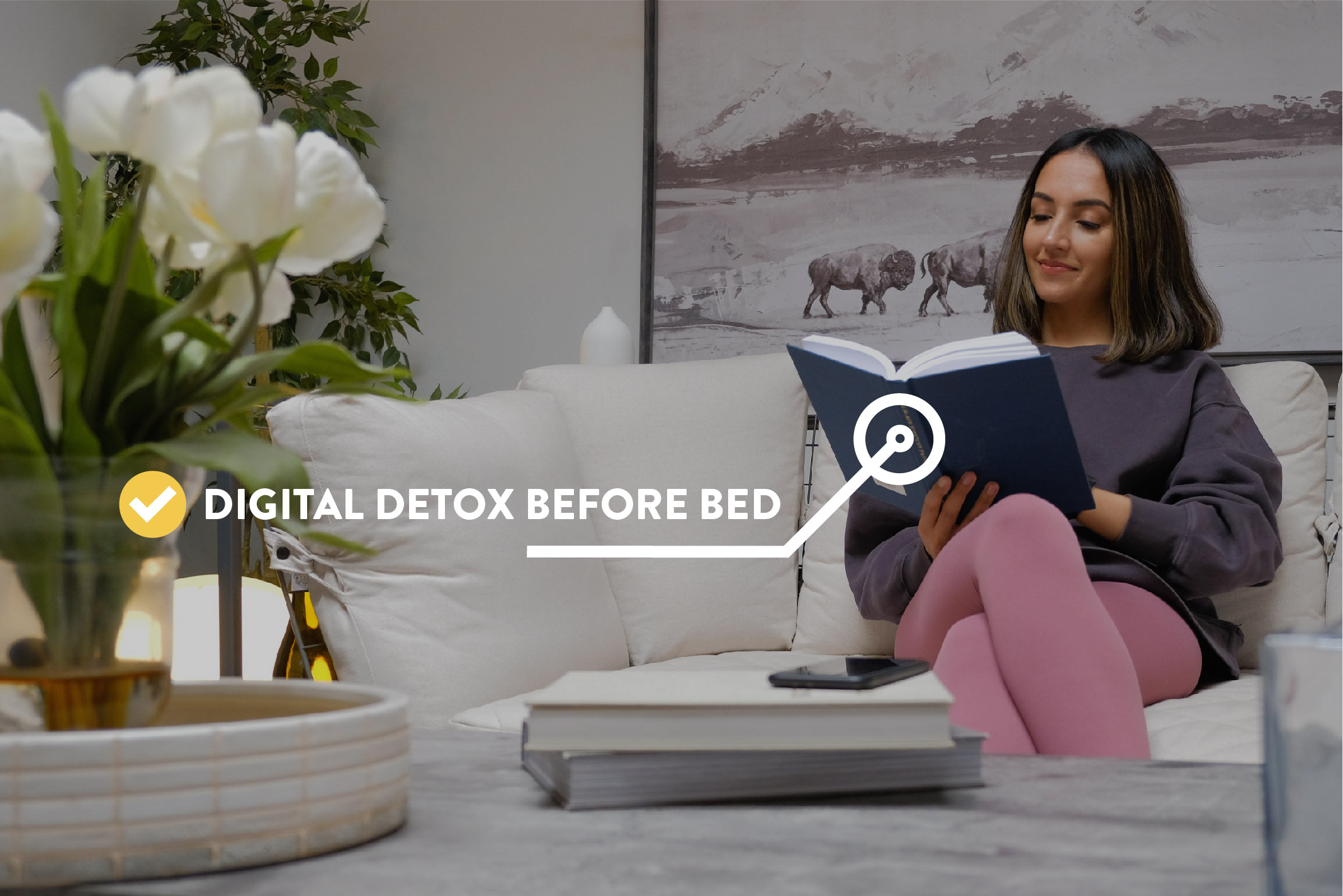
Removing all of your digital connections before bed might seem like a suggestion to return to the Stone Age. However, habitually turning off your electronics at least an hour before bed could be the best thing you can do for your health. The screens in your life, including TVs, computers, smartphones, and even lightbulbs, emit light of a certain wavelength that can cause wakefulness. Light, especially from electronics, may prevent your body from naturally wanting to sleep [1].
The science behind light and sleep
How does light prevent sleep? When light reaches our eyes, it stimulates a nerve called the suprachiasmatic nerve (SCN) tract. This nerve stimulation stops the release of a hormone called melatonin from our pineal gland in our brains.
Melatonin may sound familiar because some people take it as a supplement to help sleep. And that’s exactly the responsibility of melatonin: sleep. So if light is around, there is no hormonal cue for your body to sleep because the SCN continues to put the brakes on melatonin release.
Once an absence of light occurs (A.K.A. darkness), that’s when melatonin is released and causes the body to prep for sleep. As you can imagine, if your smartphone (even on “night mode” and very dim) is sending light to your eyes, you’re preventing the sleep hormone from being released [2]. Looks like that late-night phone use is preventing you from sleeping…and all you were trying to do is unwind with another cute dog video on Instagram!
There is plenty of research to indicate that electronics with white and blue light wavelengths are particularly bad for stimulating the SCN and preventing sleep. They not only delay the start of sleep but also shorten the amount of sleep we experience, [3] and even the depth of our sleep becomes lessened [4].
In fact, electronic light has been shown to detrimentally influence the capacity to sleep up to three hours after exposure (5). So why is the habit only one hour before bed? Because these goals need to be attainable to achieve. Keeping habits small and realistic make them more likely to be automated.
The importance of sleep
What makes sleep health so important? Sleep has been shown to improve mental and physical health. Cognition in all measurable areas improves with quality sleep (for example, improved memory, enhanced problem-solving capacity, and decreased stress). Physical benefits from sleep include improved muscle repair, improved immune system, and weight loss.6
How to get your clients to digital detox before bed
Since we sleep every day, this health practice is perfect for habit building! This is a great one for a beginner or intermediate habit builder.
Some of the best ways you can implement this with your clients are to have them set timers on their phones an hour before bed, track their habit on Trainerize, and then charge their phone outside of the bedroom! But you’ll want to coach them through identifying what they can do with their hour before bed that does not include electronics.
Find activities they will participate in because they like it (this will make it more likely for them to do). Some helpful examples include reading a book, chatting with their partner or children, pre-bedtime personal hygiene rituals (brushing their teeth and taking a shower), or anything that includes reduced lighting and no electronic screens (like tidying the kitchen?). Setting a goal to include just weekday (or workday) evenings helps ensure their daily routine will be consistent, and therefore make your clients more likely to succeed.
Digital detox in a nutshell:
- Digital light from electronics delays the onset, depth, and length of sleep.
- Sleep is important to both mental and physical health.
- The habit of digital detox before bed is best supported by coaching a replacement habit for smartphones, television viewing, and computer use.
- Use this habit as a foundation, cohabit, or follow-up to practicing a bedtime ritual.
References:
- CA Czeisler, JS Allan, SH Strogatz, JM Ronda, R Sanchez, CD Rios, WO Freitag, GS Richardson, RE Kronauer. (1986). Bright light resets the human circadian pacemaker independent of the timing of the sleep-wake cycle. Science 08 Vol. 233, Issue 4764, pp. 667-671 DOI: 10.1126/science.3726555
- Higuchi S, Motohashi Y, Liu Y, Ahara M, Kaneko Y. Effects of VDT tasks with a bright display at night on melatonin, core temperature, heart rate, and sleepiness. Journal of Applied Physiology. 2003;94(5):1773–1776. (Bethesda, Md.: 1985) http://doi.org/10.1152/japplphysiol.00616.2002.
- Orzech, K. M., Grandner, M. A., Roane, B. M., & Carskadon, M. A. (2016). Digital media use in the 2 h before bedtime is associated with sleep variables in university students. Computers in human behavior, 55(A), 43–50. doi:10.1016/j.chb.2015.08.049
- Evening use of light-emitting eReaders negatively affects sleep, circadian timing, and next-morning alertness. Anne-Marie Chang, Daniel Aeschbach, Jeanne F. Duffy, and Charles A. Czeisler. PNAS January 27, 2015 112 (4) 1232-1237; first published December 22, 2014 https://doi.org/10.1073/pnas.1418490112 Edited by Joseph S. Takahashi, Howard Hughes Medical Institute, University of Texas Southwestern Medical Center, Dallas, TX, and approved November 26, 2014 (received for review September 24, 2014)
- https://www.health.harvard.edu/staying-healthy/blue-light-has-a-dark-side
